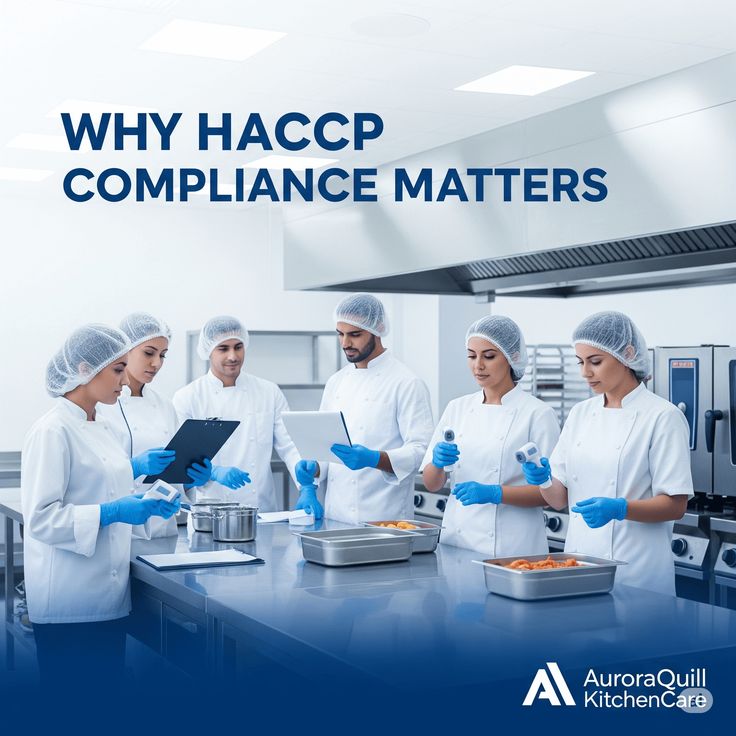Why Food Safety Compliance Matters: Protecting Your Kitchen, Staff & Customers

Maintaining a hygienic and safe commercial kitchen is not just a regulatory requirement – it’s a commitment to health, trust, and long-term business success. In this article, we explore why food safety compliance is essential and how it safeguards every corner of your culinary operation.
1. Food Safety Standards Save Lives
Food safety standards help prevent foodborne illnesses and contamination. When your kitchen follows structured guidelines, you create a safer environment for staff and diners alike.
2. Kitchen Hygiene Protocols Prevent Legal Troubles
Neglecting hygiene regulations can lead to heavy fines, temporary closure, or lawsuits. Staying compliant helps you avoid legal complications and protects your brand.
3. Safe food Practices Boost Customer Trust
Customers are more likely to return when they trust your kitchen’s cleanliness and handling procedures. Trust leads to loyalty—and loyalty means repeat business.
4. Staff Training Reduces Mistakes
Proper staff training on hygiene practices reduces the chances of food mishandling. Educated teams are your first defence against accidents and contamination.
5. Structured Guidelines Improve Workflow
Food safety compliance often involves clear workflows—from storing raw ingredients to serving the final dish. These workflows enhance operational efficiency.
6. Equipment Cleanliness Matters
Dirty or poorly maintained equipment can harbour bacteria and jeopardise food safety. Regular cleaning schedules are part of every smart food safety plan.
7. Labeling and Storage Prevent Waste
Clear labelling and proper storage aren’t just about neatness—they reduce waste, maintain freshness, and help meet safety standards.
8. Audits Keep You on Track
Routine audits ensure your kitchen is aligned with current regulations. They also highlight blind spots and areas for improvement.
9. Better Compliance = Better Reviews
Online reviews often mention cleanliness and hygiene. A compliant kitchen is more likely to earn positive feedback and better ratings.
10. Compliance Encourages a Safety Culture
When food safety becomes part of your kitchen culture, everyone contributes to maintaining a clean, compliant, and caring environment.
Final Thoughts
Food safety compliance isn’t just a box to tick—it’s the backbone of a successful, trustworthy, and sustainable food business. Make it a daily habit, not an annual chore.
What Is HACCP vs General Hygiene Practices?
You may already follow good hygiene – wearing gloves, storing foods properly – but what is HACCP does differently is give you a structured system. While hygiene is good practice, what is HACCP is legally recognised and auditable. It’s a professional food safety plan, not just common sense.
Legal Requirements and What Is HACCP
Many countries make HACCP mandatory in the food industry. In the UK, EU, and the Gulf region (including Oman), businesses must demonstrate that they follow what is HACCP or an equivalent system. Without proof of what is HACCP compliance, you risk penalties, closures, or losing your license.
Staff Training and What Is HACCP
Your entire team needs to know what is HACCP, not just the manager. A good HACCP system works when everyone – from chefs to cleaners – understands their role. Training your staff on what is HACCP reduces human error, encourages accountability, and builds a culture of safety.
Common Pitfalls When Ignoring What Is HACCP
Businesses that overlook what is HACCP often make critical mistakes – mixing raw and cooked items, skipping temperature checks, or not documenting processes. These can result in food poisoning or allergic reactions. Understanding what is HACCP helps prevent these issues before they arise.
How to Get Started with HACCP
The first step to implementing what is HACCP is conducting a thorough hazard analysis. Identify your risks and create a flow diagram of your food process. From there, document your controls and assign responsibilities. There are many online courses and consultants who can guide you through what is HACCP for your specific business.
Final Thoughts: What Is HACCP Is More Than Just a Requirement
Now that you know what is HACCP, it’s time to act. It’s not just a legal requirement – it’s a smart investment. Customers are more health-conscious than ever. Showing that you understand what is HACCP builds trust, improves your reputation, and can even become a marketing advantage.
Food and Drug Administration (FDA) – Food Safety
- https://www.fda.gov/food
Official U.S. government resource for food safety regulations, recalls, and guidelines.
